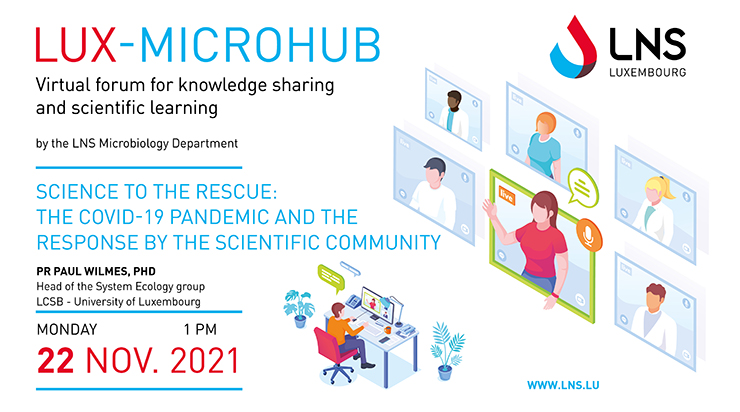- The Laboratory
- Organization
- Departments
- Jobs
- Analysis book
- Contact
- News
- Publications
- Download



The COVID-19 pandemic put virtual meetings at center stage. The LNS Microbiology department would like to capitalize on this new scientific era by gathering online interested parties for knowledge sharing and scientific learning. The team therefore created the virtual forum, Lux-MicroHub, to bring you together, on a monthly basis, to present and discuss the latest advances in Clinical Microbiology.
Thus, it is a great pleasure to invite you to attend the 5th webinar Lux-MicroHub which will take place Monday, 22 November 2021 (01 pm) via the following Webex link: https://lns.webex.com/lns/j.php?MTID=mad9f8a026bf1e2428ef07effeb49f2fc
The COVID-19 pandemic has created an unprecedented public health crisis with deep impacts on health, social life, and the economy. During my talk, I will explore how the scientific community in Luxembourg rose to the challenge resulting in programmes and data, which allowed the country and its leadership to address the manifold impacts of the crisis.
After the presentation, we will dedicate time for questions to our invited speakers. If you already have specific questions, feel free to address them to luxmicrohub@lns.etat.lu before the 22nd of November.
| Paul Wilmes is Professor of Systems Ecology and holds appointments at the Luxembourg Centre for Systems Biomedicine and in the Department of Life Sciences and Medicine within the Faculty of Science, Technology and Medicine of the University of Luxembourg. He heads the Systems Ecology Research Group. During the COVID-19 pandemic, Paul acted as co-speaker of the COVID-19 Task Force of Research Luxembourg and was appointed “chargé de mission” by the University of Luxembourg. |
 Prof. PAUL WILMES, PhD |
As a British Chevening Scholar, Paul earned his PhD from the School of Environmental Sciences at the University of East Anglia (UK) in 2006. For part of his doctoral research, he spent time as a German Academic Exchange Service Visiting Scientist at the Max Planck Institute for Marine Microbiology in Bremen (Germany). Paul subsequently carried out postdoctoral research at the University of California, Berkeley (USA) from where he returned in 2010 to his native Luxembourg through the ATTRACT fellowship scheme of the Luxembourg National Research Fund. Paul was awarded an European Research Council (ERC) Consolidator Grant in 2019. He is an elected full member of the Institut Grand-Ducal, Section des Sciences naturelles, physiques et mathématiques, and the Académie Lorraine des Sciences. In 2018, Paul was awarded the Grand Prix in Biological Sciences of the Institut Grand-Ducal.
Paul’s main research focus is on using Systems Biology approaches for unraveling fundamental ecological relationships within and between microbial populations in situ. His group has pioneered the development of appropriate wet- and dry-lab methodologies for performing systematic molecular measurements of microbial consortia over space and time. This allows for example to define lifestyle strategies of distinct populations and link these to genetic and functional traits. The same approaches are allowing the study of microbiome-host molecular interactions. In this context, his group has developed a microfluidics-based in vitro model of the human-microbial gastrointestinal interface called HuMiX.
Paul has authored more than 100 peer-review publications and is a Highly Cited Researcher. He is a frequently invited speaker at international scientific symposia and academic institutions.